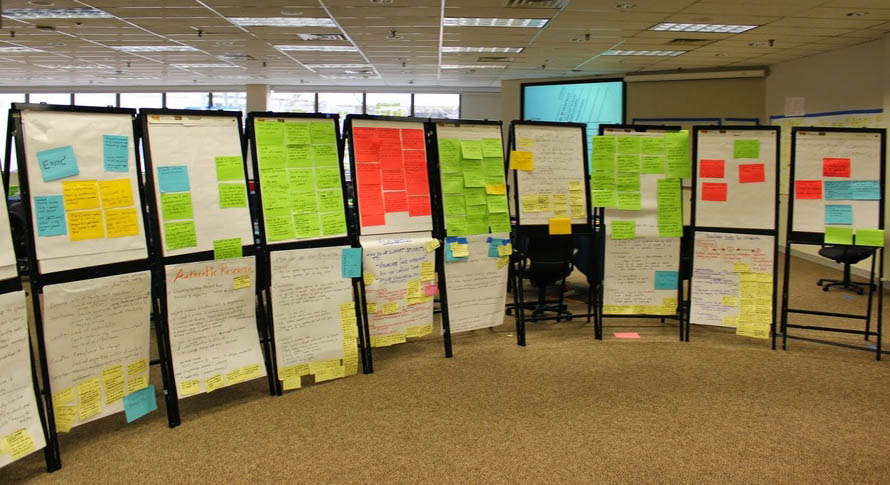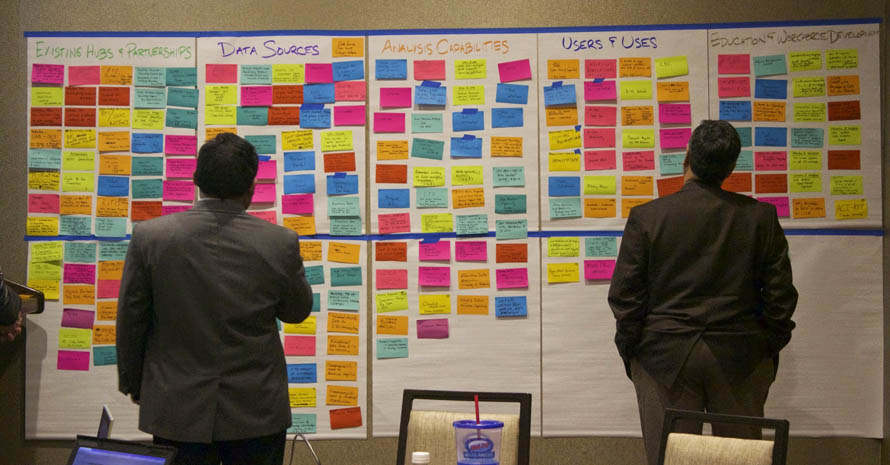First Rule of Creative Thinking
The first rule of creative thinking is to come up with lots of ideas!
But first...
It's Not Always Time For Creativity
Let's first establish when it's relevant to think creatively.
If you're headed out to lunch, you don't need to think of a hundred different things you might eat for lunch, but if you were in charge of the menu for a new restaurant, it would actually be quite useful to come up with hundreds of potential menu items, and then select only the very best ones for your menu.
So, when should we use our creativity in problem solving?
There are four things I typically ask myself before cutting loose creatively.
- Do I have ownership, or at least influence, over the problem at hand?
- Is this problem important enough to actually make my to do list?
- Is this problem complex enough or novel enough to require imagination to solve?
- Is there an immediacy to solve the problem now?
If I get four yeses, that usually means creativity is relevant, and I'll begin coming up with lots of potential ideas to solve the problem.
If you'd like a mnemonic, try four I's underlined in the above list: Influence, Importance, Imagination, Immediacy.
Phrasing Your Challenge
It helps to phrase the challenge in such a way to invite a large quantity of answers. Let's try an example.
I lost my job, and I'm broke.
That kind of phrasing doesn't help much. It's actually kind of depressing. It's stated in such a definitive way you might even think the condition is permanent.
How might I find a job?
That's better. It ends in a question mark so it at least invites answers, but let's try to invite a large quantity of potential ideas.
What might be all the ways I can find a fulfilling job?
All the ways, now that will invite lots of ideas.
Phrasing your problems as questions that invite a large quantity of potential answers is a good way to begin your idea generation, especially if you're asking others to join in on your brainstorming.
How Many Ideas Is Enough?
The answer will surprise you.

In the images above and below, one post-it note equals one idea.

Answer: In the hundreds.
One of the things I do in my work is facilitate innovation labs. I've done this for NASA, Fortune 500 companies, and bootstrapping entrepreneurs. Each time, it has been necessary to come up with several hundred ideas before the experts in the room begin to see things they hadn't come across before.
As people become experts in a field, whether in marketing, HR, or a scientific discipline, they exhaust all the usual methods of pursuing goals and doing their work. A new idea becomes a rare occurrence.
One crucial aspect of getting to innovative ideas, especially for people who are advanced in their discipline is to come up with lots of ideas.
Go beyond where you have in the past.
Why Does This Work?
The reason coming up with lots of ideas helps you get to the very best ideas is two fold.
First, the odds are in your favor. If you only come up with a handful of ideas, well, that's all you have to choose from. Whereas if you come up with hundreds of ideas, you have much more favorable chances of having some unique and valuable ideas in the mix.
Second, as you come up with more and more ideas, your ideas become increasingly interesting and novel.
Think about it. If I ask you to think of some ideas for superhero powers your brain instantly goes to flying, super speed and strength, healing, breathing under water, controlling time; all the things you read about in comic books and watched in cartoons when you were young. You would have to come up with lots of ideas before you said, Vibrating your beard to amplify the WiFi signal,
or The power to harness political apathy as a renewable source of energy.
When we work with teams to produce unique, original ideas to solve complex problems we commit a healthy amount of time to come up with hundreds of ideas, before selecting, developing, and evaluating ideas to build business cases around. We do this, of course, if and when it is relevant to use creativity.
What About Writer's Block?
Some people are just creative. I'm not like that.
When you hear someone say limiting things about themself, do you get angry or become very nurturing?
Definitely a little bit of both for me.
Everyone is creative. At the very least, we were all creative as children. The basic aspects of creative thinking are present in all of us. They're there, because humans needed to adapt to survive over thousands of years of evolutionary history. You are here, because your ancestors adapted to change again and again over millenia.
This doesn't mean that creativity won't manifest musically for some, linguistically for others, and so on. Of course, talent varies, but the basic ability of enumerating possibilities is fundamental to the structure of your brain.
Building on this basic notion is a set of skills that we on our team refer to as creative thinking, and they are a core element in an organization's innovation capacity. Creative thinking skills can be learned and improved with practice and good coaching. Here are a few actions and attitudes that help specifically with coming up with lots of ideas.
Suspend your judgment.
The biggest mistake we often make in problem solving is akin to pressing on the throttle and the brake at the same time. When you're thinking creatively, as you must to come up with ideas, your brain is active in one way, and when you're thinking critically, as you must to evaluate ideas, your brain is active a different way. Switching modes every time you come up with an idea to evaluate that idea is taxing. You never really fully step into one mode or the other.
The best thing to do is defer evaluation completely, and just focus on generating as many ideas as possible first.
At first this will be challenging, like any new skill, but once you get the hang of it, it's fun and quite simple to do.
Critical thinking is important. I'm not saying not to do it, just to defer it until you've come up with a healthy amount of ideas to consider.
Build on ideas.
Each idea can be built upon to generate a whole new idea.
Let's use food to market our new product.
Yes, and let's have people cook it themselves! They'll be so proud.
Ooo, maybe they can take pictures of their creations and share them on social media!
Building on ideas is an easy way to get a large number of ideas along a single line of thought.
If you want to go off in a new direction...
Make seemingly random connections.
What would Tom Hanks do?
How would Will Smith solve this problem?
How would Winnie the Pooh?
In what ways might long-lasting batteries or high altitude weather balloons inspire a solution to my problem?
Prompts like these are awkward, yes, but their intention is simply to inject novelty into the process. A different angle or coloring often helps you shift your thinking in a new direction, opening up a path to a whole new set of ideas.
Remember, don't judge yet. Just come up with ideas.
Use humor and play.
When used appropriately, humor is a powerful primer for creative thinking.
Humor invites novelty, increases risk tolerance, decreases judgment, and in many ways accelerates idea generation. It's almost like a lubricant for your brain's creative processes.
Be appreciative and seek new possibilities
Appreciate the creativity in the room, especially when coming up with ideas in a group setting.
Say, Oooo,
and Ahhhhh
a lot. It will encourage people to come up with more ideas.
Think about novel possibilities.
Throw out sentences that start with the words, What if..,
Maybe..,
or How might...?
This infusion of possibility, or optimism, will further encourage creative thinking.
Enjoy the process.
Being creative is one of the most rewarding experiences your work life has to offer you. If you think about it, all the economic value in the world originated in someone's imagination at some point, and above and beyond the economic value being creative is deeply fulfilling and emotionally rewarding.
Give the gift of being creative to your team and to yourself, even if it's only for a small part of the work week.
Sources
The term third third
was originally coined by Tim Hurson who probably adapted it from someone else.
I learned the predictable superhero powers activity from David Lomas who likely learned it from Tim... haa!
(It's honestly a bit of a challenge to cite things in the creativity community. There's so much simulatenous invention and adaptation. Suffice to say, we stand on each others' shoulders in some kind of optically illusive Catalan people pyramid.)
